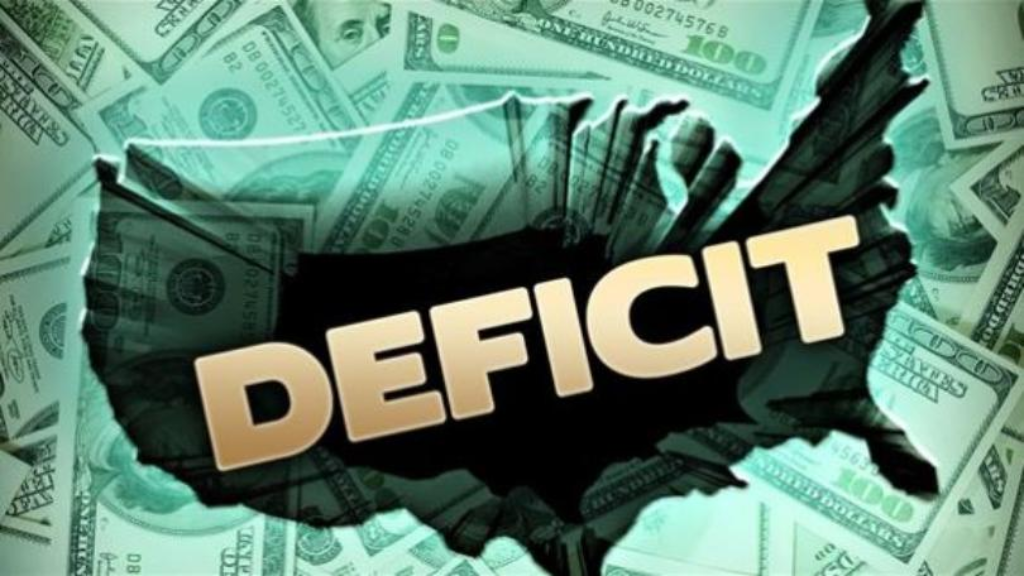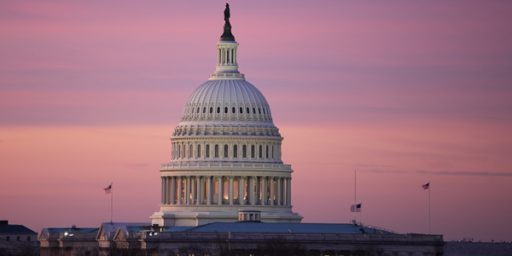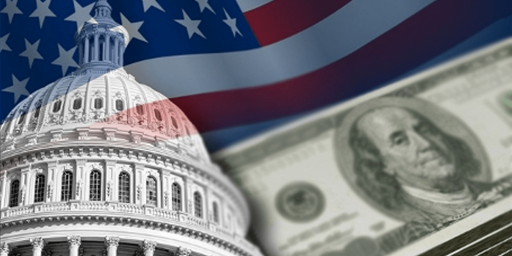Budget Deficit On Pace To Exceed $1 Trillion For Current Fiscal Year
Two years of Republican control of the Legislative and Executive Branches has put us back on a path toward $1 trillion budget deficits.

The Federal Budget Deficit continued to rise during the final month of complete Republican control of Washington, and it’s on track to hit $1 trillion by the end of the current Fiscal Year:
WASHINGTON — The federal budget deficit continued to rise in the first quarter of fiscal 2019 and is on pace to top $1 trillion for the year, as President Trump’s signature tax cuts continue to reduce corporate tax revenue, data released Tuesday shows.
The monthly numbers from the Congressional Budget Office also show an increase in spending on federal debt as rising interest rates drive up the cost of the government’s borrowing.
The widening deficit comes despite a booming economy and a low unemployment rate that would typically help fill the government’s coffers. Federal spending outpaced revenue by $317 billion over the first three months of the fiscal year, which began in October, the budget office reported. That was 41 percent higher than the same period a year ago, or 17 percent after factoring in payment shifts that made the fiscal 2018 first-quarter deficit appear smaller than it actually was.
The report did show one area of increasing revenue — from Mr. Trump’s sweeping tariffs. Revenue from levies on imported steel, aluminum and Chinese goods were up $8 billion from the same quarter a year ago, an 83 percent increase. That increase, however, is nowhere close to the levels needed to support Mr. Trump’s frequent claims that his tariffs will help pay down the national debt.
This fiscal year is the first to fully incorporate the reduced tax rates that Mr. Trump signed into law in late 2017, including cuts for individuals and closely held businesses and steep reductions for corporations. It continued a trend from the final three quarters of 2018, after the tax cuts took effect: falling tax receipts, at a time of relatively strong economic growth — a combination that shows the tax cuts are achieving nothing close to the administration’s promise that they would pay for themselves.
Corporate tax receipts fell by $9 billion for the quarter, or 15 percent. Individual receipts fell by $17 billion, or 4 percent. Interest costs on the debt rose by $16 billion for the quarter, or 19 percent. Interest costs for December were up 47 percent from the same month in 2017.
“It is entirely predictable and utterly depressing,” said Maya MacGuineas, the president of the Committee for a Responsible Federal Budget, which advocates deficit reduction. “At a time when we should be working to keep the strong economy going and bring our debt down, our lawmakers seem unwilling to pay for anything and they just keep adding to the debt. All signs point to that it will continue to get worse before it gets better.”
This news shouldn’t come as a surprise, of course. We’ve largely been on this course ever since Republicans took control of the Executive and Legislative Branches after the 2016 election. Among the consequences of that power was the passage in December of 2017 of a tax “reform” package that, in addition to apparently reducing the amount of revenue coming into the Federal Government notwithstanding the predictions to the contrary that Republicans made at the time, is projected to add roughly $1.5 trillion to the national debt over the course of the next decade. This was quickly followed by the passage of a budget by a Republican Congres and White House that made clear that we were headed for a return of the era of trillion dollar budget deficits. This would not be the first time we saw deficits that high, of course. We reached similar levels during the early years of the Obama Administration, something that led Republicans to issue their usual calls of fiscal irresponsibility. The difference between then and now, though, is that those Obama Era deficits were primarily the result of the fact that we were still dealing with the impact of the Great Recession and that the recovery which began in 2009 was still very much in its infancy. This time, the record-setting deficits that we are likely to see for the foreseeable future are coming at a time when the economy continues to boom during what has become one of the longest economic recoveries in history, and that they come at a time when financial markets are becoming increasingly sensitive to higher levels of debt and interest rates. When the final budget deal was put forward in mid-February of last year, it included massive spending increases in almost every budget category and busted through the controls that had been put in place by the Budget Control Act of 2011, a controversial bill passed during one of the many fiscal showdowns between former President Obama and Congress that occurred after Republicans captured the House in 2010. As The New York Times noted at the time, this effectively means that Republicans have learned to love the deficits and debt they once claimed to abhor. In other words, the Republican Party, which had spent the Obama years railing about spending and deficits, had become the party of deficits and debt. By April of last year, the Congressional Budget Office had officially forecast that we’d be seeing trillion dollars deficits by the end of Fiscal Year 2019 and just a few months later, the national debt crossed a new benchmark and was north of $21 trillion.
While one might consider this hypocrisy on the part of a Republican Party that has preached the gospel of fiscal responsibility for years, the truth is that it’s entirely consistent with how the GOP has acted so many times in the past that it’s easy to lose count. For the most part, the supposed Republican fidelity to fiscal responsibility and their concern about rising Federal Budget deficits and the National Debt is something that has proven to be little more than a political slogan that was largely based on who controlled the White House. When former Presidents Bill Clinton and Barack Obama were in power, for example, Republicans argued that out of control spending and deficits were destined to drive up interest rates, cause the national debt to explode, and increase interest rates. They used these issues as political cudgels against the Democratic White House during both Administrations and, of course, as a way to appeal to voters and supporters. Riding this wave, the GOP was able take control of both Congress and, eventually, the White House, but then things suddenly changed.
During the Administration of George W. Bush, for example, Republicans managed to preside over massive increases in spending that were quite plainly fiscally irresponsible. On the domestic side of the equation, they introduced a massive new trillion dollar entitlement in the form of Medicare Part D without finding a way to pay for it. Similarly, they introduced education policy legislation such as the No Child Left Behind program that led to increases in Federal spending, again without any provisions about how it was going to be paid for in the future. Under President Bush’s leadership, they authorized and fought two wars, only of which was actually justified and necessary, that imposed serious financial burdens on the Federal Government both while the war was being fought and well into the future. On top of all that, they cut taxes. While that is not a bad thing in and of itself, and I’m certainly not going to argue against the lower tax burden that I and most other Americans had during the Bush years, from the perspective of fiscal responsibility it’s an utterly insane strategy. This is especially true with respect to the issue of the Iraq and Afghanistan Wars. In the past, we had traditionally found ways to finance wars via what usually ended up being a combination of higher taxes and short-term debt in the form of war bonds and other means of financing. No such effort was made to do this during the Bush years even though it’s likely that the White House could have made a convincing political argument that we needed to find a way to pay for the war that was necessitated by the September 11th attacks. Instead, President Bush chose to basically let the political capital he had gained in the wake of the attacks and the Republican Party in Congress took the position of Alfred E. Neuman and adopted a “What, me worry?” position when it came to fiscal responsibility.
Congratulations Republicans, this is what you voted for.





Fortunately for us Republicans are perceived, despite decades of evidence to the contrary, as the party of fiscal responsibility, and their 2017 tax cut will not only pay for itself, but it will inevitably
reduce the deficit to zero.
Really, this time for sure! Trust me on this.
When was the last time a Republican administration produced a balanced budget? Nixon, maybe? At least the Republicans are still the party of personal sexual morality. And prudent foreign policy, of course.
@Slugger:
Eisenhower.
@Kylopod:
Ah Dwight David, that RINO
We’ll need AOC’s 70% marginal rate simply to dig the country out of the hole that it is in, forget about new socialistic programs.
@Slugger: Oh no! Eisenhower had lots on his plate like the Strategic Air Command and the interstate highways. Nixon had war expenses (he fought the Vietnamese longer than LBJ did) and the oil shocks and was a HORRIBLE budget manager. He actually instituted a program to have the U.S.Gov’t ‘control’ wages and prices. The last Republican to submit a balanced budget to congress was Hoover. Which might explain why it’s not actual Republican PRACTICE. It’s only something to attack Democrats about.
The legacy of Paul Ryan, Fiscal Hawk.
/snark
@Daryl and his brother Darryl: It seemed like, as part of the door hitting him on the way out, that suddenly some of the supposedly liberal MSM were finally willing to call Ryan a fraud. Too late to do any good, but something.
@JohnMcC: Had a nagging feeling about Ike’s deficit. Kylopod is no one to disagree with! According to thebalance.com the 1960 budget submitted was zero deficit but somehow the total debt still increased and they helpfully but tersely remark “recession” as influencing the numbers.
Otherwise, the last non-deficit budget was Hoover’s in 1931.
Evidently the drain line on the swamp is stopped up. Time for a balanced budget amendment.
Eliminate unneeded, wasteful, antiquated, and repetitive agencies and departments. I have listed numerous here in the past, many that Congress is totally unaware of. Well, Congress is unaware of many things.
Across the board 5% budget cut for every department and agency. They spend that much on their office coffee set up: let the employers contribute money like real businesses do. Modernize agencies in terms of technology: get rid of the Tandy computers, mimeograph machines, slide projectors, typewriters, and rotary dial phones. Reform the purchasing procedures – let the agencies shop any where for supplies and equipment: enough of the $400 hammers, $640 toilet seats, and $7600 coffee makers (military expenditures).
Take a look at the foreign aid: what does the money go for and is it effective.
It’s worth pointing out that as a result any money spent on the wall would be borrowed money.
Not really very much money. Dont worry about it. Unless a Democrat becomes POTUS again and then it will become a CRISIS!
Steve
The GOPs, of course, want to use the deficit to force cuts to SS and Medicare. Along about 2021 they may find that petard being used to repeal their tax cut.
@Tyrell: well, that’s just dumb.
If we were going to go with any form of mandated budgeting, why would we go with arbitrary cuts? I would want to raise taxes when we have a shortfall. High taxes make congresscritters angsty and force them to make choices — cut intelligently, or pay for what we are doing.
@al Ameda: “Hey, Rocky! Watch me pull a rabbit outta my hat…”
@Slugger: 1969.
https://fred.stlouisfed.org/series/FYFSD
@Ben Wolf: Well, I have link-envy! Mine never work that well.
Seriously, that’s an interesting graph. I would invite an examination of the upward spikes toward the right-hand side and how they reflect Dem control of the budgetary process. But, of course, we knew that already.
The interesting thing is the long stable line on the left. I see you’ve selected to begin with 1910. Did you know that up until (I think) 1913 there was a law requiring that all federal funds be kept secure in the actual Treasury? It dates back to the Jacksonian war on the National Bank and the 1840’s. There was a serious debate until the New Deal as to whether the USGov’t was constitutionally allowed to fund ‘improvements’ and whether those expenditures could be borrowed. So the Eire Canal had to be financed by the State of NY (with various Bank and Tycoons bought-in). In the Great Depression’s early days the Hoover administration actually used a law that allowed grain to be shipped to places where harvests had failed — to feed livestock. So starving Americans were eating (or not eating) food shipped in as a ‘work-around’.
That insanity is what is reflected in that long stable period to the left of the time-line of that graph.
@Gustopher: That sounds sensible. Have tax increases in an off
year, tax cuts in a good year. I think some states base the next year budget on the current year revenues : increase spending or cuts. That’s an idea.
@JohnMcC: The other thing that may be worth noticing in the chart is that recessions in the earlier years tended to be longer and more frequent, which seems to show that the New Dealers must have done something right (or wrong, if one really believes that “the invisible hand” should be the force for balance).
(Does anyone really believe that? I mean I know Conservatives SAY they do, but c’mon…)
@Just nutha ignint cracker: Copy that! I was recently reading a bit about the Jackson war on the Hamiltonian Bank. Talk about a clusterf#ck! One major result of having such a shortage of financing was that states took the initiative (as in NY building the Eire Canal) and actually issuing their own currencies with the problems you can imagine. What was a Delaware dollar worth compared to the Virginia dollar? How is that different than yesterday? And as we remember from old western movies, actual gold nuggets and powder were media of exchange. Etc.